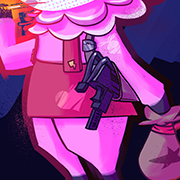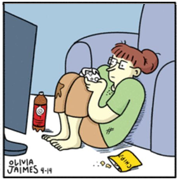|
Just pointing out that being able to discuss what your choices were in any design decision and why you chose what you did is a huge asset in a designer. If there's no explanation, it's easy for someone to say "I don't like it, next!" If there's something detailed, they can see the thought process behind the decision and they can say "This is a rational person, and if we disagreed about something we could probably discuss it and reach a solution." Or they can say "those are too many words about being wrong, next!" Also re: meetings - our design meetings tend to follow one of these patterns:
Fortunately I'm not party to the meetings that involve management. Those are generally Horrible.
|
|
|
|

|
| # ? May 29, 2024 09:37 |
|
Shalinor posted:This is really the issue, and isn't one most want to hear. There isn't a grave social injustice being done to female developers in the present market, it's just that there are few of us period in the engineering/etc side of the industry, which makes us a curiosity. It'd be like a Caucasian getting a job in India as a tech support guy - you're probably going to be notable in a lineup of your coworkers, and culturally, you might find a lot of what they do offensive or otherwise objectionable, even though it's typical for their culture. Amrosorma posted:Being a white guy in India is a very different experience than being a woman in a historically and currently male-dominated industry though. A better example would be like being a black person in an i-banking job. Not that I know what being a woman is like, but as a white guy in East Africa, I think it's probably a good comparison. I'm stared at all day, constant whisperings, people either treat you with reverence or contempt (I would kill for some apathy.) Leif. fucked around with this message at 07:29 on Jul 29, 2011 |
|
|
|
Black Eagle posted:This is false. An industry is a commercial ecosystem -- economic inputs and outputs. GameStop is a retailer, otherwise known as a distributor. Distribution is very much a part of the business of video games. As such, if you work at GameStop, you work in the retailing segment of the industry. The phrase "in the industry" does not strictly mean that you work at either a developer or a publisher. The phrase "in the industry" does not strictly mean that you only develop or publish AAA games. The phrase "in the industry" also does not strictly mean that you are an artist, designer, programmer, musician, or other creative professional. Such ideas are actually quite harmful to the professional community. I utterly disagree. GameStop is a distributor, and if one works for GameStop in a corporate capacity, I would consider them in the industry. However, working a menial retail labor job (note: I was an EB associate for a few years back in the day) has nothing substantially to do with the actual industry. You push a product. You don't have anything to do with the creation of that product. You don't have anything to do with the decisions on how that product is distributed. You are simply told "Here, sell this." It is a process that is facing essentially pure automation from the digital distribution model. Compare Steam to Gamestop. At the corporate levels, someone who works for either is clearly involved with determining how distribution will be handled. But Steam has been able to almost entirely cut out the retail component because it requires little to no actual human input.
|
|
|
|
Diplomaticus posted:Not that I know what being a woman is like, but as a white guy in West Africa, I think it's probably a good comparison. I'm stared at all day, constant whisperings, people either treat you with reverence or contempt (I would kill for some apathy.) Being brown (and often confused for black) in America, I totally feel you bro At least I always get the three seat to myself on the train 
|
|
|
|
Super Slash posted:Also not the most outstanding one, but I've come to the conclusion that my portfolio blows dicks (http://lee-hodges.co.uk/). I clicked the sandtrapped link and was told about the story and where in Halflife 2 the mod takes place. There was nothing at all about the level design. Which I thought was pretty odd for a level design portfolio. Also there's some fullbright map in there somewhere. Never show that. quote:In short; "Skill Atoms" are the process of how a player learns to control a video game, and to express this the level was built to accommodate the control systems a beginner player would be comfortable with, as well as the advanced maneuvers an advanced player would use I looked at some of the UT stuff and there's more description of process there, but it's all "we thought this", "we wanted to do that". Which may well be the case, that everything was a group decision. But I'm not hiring your whole class, so I don't care. Tell me exactly what you contributed to the whole. Tell me your decisions, show me your work. I don't think you're a bad level designer; but it's impossible to tell, because the screenshots and videos I saw weren't hugely impressive visually, and you don't talk about the thoughts that go in to your design process at all. That's why you're not getting interviews - there are neither words nor pictures that tell me how good you are. FreakyZoid fucked around with this message at 08:26 on Jul 29, 2011 |
|
|
|
Diplomaticus posted:I utterly disagree. GameStop is a distributor, and if one works for GameStop in a corporate capacity, I would consider them in the industry. However, working a menial retail labor job (note: I was an EB associate for a few years back in the day) has nothing substantially to do with the actual industry. You push a product. Frankly, I think even this is a stretch. By the same logic, Walmart is in the furniture, fashion, automotive, gardening, etc. industries. Industry side "distributors" (to use Black Eagle's terminology) are the publishers. The people they sell things to are in the retail industry even if their focus is video games. Similarly the people retailers sell to are (generally) "customers". Marketing, legal, etc. are the publisher are absolutely in "the industry", but not everyone they deal with on a regular basis is. Jaytan fucked around with this message at 08:20 on Jul 29, 2011 |
|
|
|
Also worth noting is that game retailers gently caress us all over with used game sales. Day 2 used game, a few quid lower than the price of a new copy; none of it goes to the people who made it. If they're part of the industry they do a good job of loving it over.
|
|
|
|
Diplomaticus posted:You don't have anything to do with the creation of that product. You don't have anything to do with the decisions on how that product is distributed. You are simply told "Here, sell this." Jaytan posted:Industry side "distributors" (to use Black Eagle's terminology) are the publishers. The people they sell things to are in the retail industry even if their focus is video games. Similarly the people retailers sell to are (generally) "customers". Akuma posted:Paraphrase: "Used game sales are bad!" Adraeus fucked around with this message at 09:15 on Jul 29, 2011 |
|
|
|
Tricky Ed posted:
Would love to hear some of these, even in general terms. And Black Eagle, knowing a number of recruiters, I will say this: Regardless of what tangential relationship retailers have to the industry (However valid) if you try and use non-corporate retail experience as "Industry experience" on a resume you will be alternately laughed at, pitied, and finally ignored, so I guess regardless of the technical definition, as far as reality is concerned it doesn't matter.
|
|
|
|
GetWellGamers posted:And Black Eagle, knowing a number of recruiters, I will say this: Regardless of what tangential relationship retailers have to the industry (However valid) if you try and use non-corporate retail experience as "Industry experience" on a resume you will be alternately laughed at, pitied, and finally ignored, so I guess regardless of the technical definition, as far as reality is concerned it doesn't matter. Well, calling out work experience by industry on a resume doesn't tell an employer anything useful about the job seeker's capabilities; sales, customer service, and store management experience can be very valuable; and effective resumes are tailored to the targeted positions. For a job seeker with point-of-sales experience — which involves logistics (e.g., purchasing, inventory control) in addition to face time with consumers, depending on the level of responsibility — including that experience on a resume when looking for a job as a designer or programmer would probably not be wise because that experience is mostly irrelevant. (However, some employers, especially startups, want creatives who understand the video game business from design to delivery!) Such experience could make a job seeker a worthwhile candidate for marketing, business development, or even top management positions at a variety of companies within and beyond the video game industry because the related skills are transferrable.
|
|
|
|
Black Eagle posted:Lost opportunities are not real losses. How is that not a loss?
|
|
|
|
Black Eagle posted:For a job seeker with point-of-sales experience — which involves logistics (e.g., purchasing, inventory control) Which is why I differentiate corporate vs. sales associate. The latter almost uniformly have no control over any of the above. Not sure when the last time you worked at an EB/Gamestop was, but you generally don't get to control any of those things. It all comes down from their corporate management. Store managers have some very minor influence on what comes in, but even then, most of the decisions come from the regional level or higher (at which point, I would begin to start weighing their argument of being "industry".) And this is without even touching the fact that a huge number of those sales associates have no idea what they are talking about involving games -- it is very common for an associate to extoll the virtues of a game they have never played or never even reviewed, for the purpose of making a sale. That kind of false marketing is common in the retail industry, because that's where those jobs truly lie. By your train of logic, an unemployed gamer is "in the industry" if he is whiteknights a game on an internet forum. Look at it another way. If you had two otherwise identical applicants at a gamestop; one of them has worked retail in the mall for 20 years and is familiar with POS/cash registers, store opening/closing procedures but has never played a video game in his life; and the other has been coding game engines for 20 years but has never sold a thing in his life, who do you think is better qualified to be the sales associate (hint: it's the first one.)
|
|
|
|
Akuma posted:What does that even mean? If potential customers walk into a store the day after a game releases, and see the same game on two different shelves, only one is slightly cheaper, a lot of them are just going to get the cheaper one. How is that not a loss? Diplomaticus posted:That kind of false marketing is common in the retail industry, because that's where those jobs truly lie. quote:By your train of logic, an unemployed gamer is "in the industry" if he is whiteknights a game on an internet forum. quote:If you had two otherwise identical applicants at a gamestop; one of them has worked retail in the mall for 20 years and is familiar with POS/cash registers, store opening/closing procedures but has never played a video game in his life; and the other has been coding game engines for 20 years but has never sold a thing in his life, who do you think is better qualified to be the sales associate (hint: it's the first one.) quote:Store managers have some very minor influence on what comes in, but even then, most of the decisions come from the regional level or higher (at which point, I would begin to start weighing their argument of being "industry".) I want to switch gears a bit and ask why. Why do you want to apply a very narrow definition to "video game industry"? Is there a real reason that's meaningful to commercial enterprise? Are you merely being pedantic? Or do you fear that you will somehow become less special as the industry grows and encompasses an increasingly wider range of disciplines and functions? For example, this flow chart illustrates the basic model of the music industry:  What would be your rationale for excluding every component of this process, except for the artist (read: developer) and the label ("marketing/promotion", read: publisher), from the music industry?
|
|
|
|
Akuma posted:How is that not a loss? Other people suggest that there's a class of "2nd hand" gamers who will never buy new, but who would if that was the only option available to them. As far as I know there have never been any hard figures produced to prove or disprove either theory though. You'd need to survey people leaving shops and find out what they did buy, or why they didn't buy, and what they traded in etc. (Oh and also the idea that if someone plays, say, Assassin's Creed 2nd hand and enjoy it, they may turn in to a day 1 customer of the sequels, or you may get DLC purchases etc. from them.)
|
|
|
|
Black Eagle posted:I want to switch gears a bit and ask why. Why do you want to apply a very narrow definition to "video game industry"? Sure, it could be a more general purpose thread where Gamestop employees bitch and moan about their dumb customers as well. But it isn't that thread.
|
|
|
|
FreakyZoid posted:Sure, it could be a more general purpose thread where Gamestop employees bitch and moan about their dumb customers as well. But it isn't that thread.
|
|
|
|
Black Eagle posted:Let's say that you're running an ad agency. After you've bid for a contract, another agency bids for the same contract at a lower price. The prospective client chooses the other agency. Your agency lost an opportunity; you didn't incur any real losses. Now, let's say that you've had a client signed for some time. Another agency courts that client and their business walks away from you. That's a real loss. Missing an opportunity is not the same as losing a customer.
|
|
|
|
Akuma posted:Your example is flawed because the "other agency" isn't just selling a competing product, they're reselling your product and keeping all of the money. We're not talking about customers choosing a competing game; they're choosing your game, but you're not getting paid.
|
|
|
|
FreakyZoid posted:The idea is that without the money recovered from trading in their last purchase, people wouldn't be able to afford to buy as many brand new games on day 1. I say carrot over stick, promising DLC can encourage retention and get money from second-hand buyers. And I liked what Mass Effect 2 did with the the optional extra content for people who bought new. Beyond that if you want second hand eliminated I think you need to drop prices, because I think a lot of people simply won't pay £35-45 for a game, especially if they can't trade it in once they are done. Another good suggestion: don't make games people will want to trade in within days of release. I actually saw two copies of TNA Impact for the PS2 on sale second hand in Game something like a week before it was released, I don't know how that happened beside it being that bad.
|
|
|
|
BizarroAzrael posted:Another good suggestion: don't make games people will want to trade in within days of release.
|
|
|
|
Irish Taxi Driver posted:Excellent Advice FreakyZoid posted:More Excellent Advice Following up on this; I think I will be trimming the crap as I've fallen into the trap of "I may as well upload everything I've got since there's nothing else" I'll probably take down the TF2 map until it's done, since it's not even finished yet as it's one of my current projects. The fullbright map simply has to go since it's a massive eyesore, as I said I'd fix it last year but that never happened. (Also when people say properly backup your work, do it, otherwise you look like a bellend like me without your texture source files) I also totally agree with the fact that I need to talk about the design processes more, as I admit the details are pretty much just waffle. Plus I really need to add some layout sketches and proper schematics. Thanks for the much needed critique, I'll definitely be retooling the site with everything that's been mentioned. I'd much rather be judged here compared to friends who'll just say "Yeah man, looks cool".
|
|
|
|
Stemming the tide of the debates that are starting to seem more and more like one of those game dev meetings we were talking about earlier, here's my portfolio for commentary. I graduate in december, so I'll have to start applying for REAL jobs instead of just internships in the next couple months. http://www.worthdayley.com Also, Avalanche/Disney Interactive internship has been amazing. This ARTIST has been able to participate in art AND design due to the nature of our seating arrangement. It's been really cool to have the main designer that you sit with bring the game director over and ask you to tell him that thing you were talking about yesterday. It goes to show that cubicles suck and anyone can make meaningful direct contributions to the process no matter what their title. Well, except Gamestop employees, they're scum.
|
|
|
|
endlosnull posted:That video is amazing and it made me laugh but it linked me to this related video Oh so they hired a model to talk BS about their school. Nice. I don't even think my friend at Blizzard makes that much money. Edit: showed it to a friend at work and there was no Amber in the art credits for what she said she worked on. Alterian fucked around with this message at 15:06 on Jul 29, 2011 |
|
|
|
endlosnull posted:That video is amazing and it made me laugh but it linked me to this related video That was painful. guenter fucked around with this message at 15:51 on Jul 29, 2011 |
|
|
|
Alterian posted:Oh so they hired a model to talk BS about their school. Nice. I don't even think my friend at Blizzard makes that much money. I like her bluetooth headset, it really makes her look like a developer.
|
|
|
|
FreakyZoid posted:I agree with you, I'm just saying that those are the arguments for used sales being healthy for the games industry. I agree with the sentiment that used game sales are healthy. People who sell used games tend to go buy more games. Win, win! As I see it, the problem only really materializes with Gamestop making an industry around it. Gamestop buying a week old game from some kid for $20 and turning around and selling it for $55 while a new copy is still $60 (And pushing that used copy, hard) isn't really good for anybody but Gamestop. If they gave that same kid $50, I doubt anyone would be talking about it.
|
|
|
|
FreakyZoid posted:I agree with you, I'm just saying that those are the arguments for used sales being healthy for the games industry. Somewhat on this topic, how do you guys feel about the 10-5 dollar Online Passes/DLC passes that a lot of companies are doing now to get money off used games. I personally think its a good idea and have no problem with it. If I buy the game new, I get everything for free.
|
|
|
|
GeauxSteve posted:Somewhat on this topic, how do you guys feel about the 10-5 dollar Online Passes/DLC passes that a lot of companies are doing now to get money off used games. I think it's misguided. Measures like this don't have any appreciable effect on Gamestop, they're still going to stock and sell the game the same way they do now, and the end user ends up paying more than retail for a fully-enabled copy of the game.
|
|
|
|
Project 10$ / Online pass etc. isn't meant to have an effect on Gamestop, it's just an attempt to see some money from 2nd hand sales. That players end up paying more is down to Gamestop not lowering their 2nd hand prices for games - that's really between them and the customer. I've got no problem with it, I think it's pretty healthy and I haven't heard anyone outside of gamer internet forums complain about it.
|
|
|
|
guenter posted:As I see it, the problem only really materializes with Gamestop making an industry around it. Gamestop buying a week old game from some kid for $20 and turning around and selling it for $55 while a new copy is still $60 (And pushing that used copy, hard) isn't really good for anybody but Gamestop. If they gave that same kid $50, I doubt anyone would be talking about it. I actually quite agree with the sentiment, but this is just a small symptom of the acknowledged problem that GameStop generally sucks, and treats everyone involved with them pretty shittily.
|
|
|
|
FreakyZoid posted:Project 10$ / Online pass etc. isn't meant to have an effect on Gamestop, it's just an attempt to see some money from 2nd hand sales. That players end up paying more is down to Gamestop not lowering their 2nd hand prices for games - that's really between them and the customer. I'm not sure how you get from 'We implemented this pricing structure which results in consumers paying more than if they bought the game new' to 'It's Gamestop's fault for not lowering their prices in response'.
|
|
|
|
guenter posted:I agree with the sentiment that used game sales are healthy. People who sell used games tend to go buy more games. Win, win! As I see it, the problem only really materializes with Gamestop making an industry around it. Gamestop buying a week old game from some kid for $20 and turning around and selling it for $55 while a new copy is still $60 (And pushing that used copy, hard) isn't really good for anybody but Gamestop. If they gave that same kid $50, I doubt anyone would be talking about it. I agree that Gamestop is shady as hell, but if there wasn't a demand for used games, they wouldn't exist. If Gamestop suddenly vanished tomorrow, the demand would still be there and someone else would step in to fill the void. As an industry we should be focusing on how to supply that demand, rather than eliminate the second-hand market. Edit: Sorry that sounds argumentative. I agree with you. Your post was a good segue into the supply/demand topic.
|
|
|
|
Monochrome posted:I'm not sure how you get from 'We implemented this pricing structure which results in consumers paying more than if they bought the game new' to 'It's Gamestop's fault for not lowering their prices in response'. End user then buys game for $50 from GameStop, buys $10 DLC, and yay, no increase in price for the user. If Project $10 is implemented the "nice" way instead of the "rear end in a top hat" way, this is a net positive for the consumer, because the DLC should be non-critical to the core experience, and the user can choose to simply beat the game without buying additional DLC / they save $10. Mass Effect 2's a great example of that in action. ... if, on the other hand, GameStop persists in selling used copies for near-new price, that is indeed a mistake on GameStop's part - they're selling the games at above true market value. EDIT: If it isn't obvious, I really, really don't agree with the practice of hobbling used games. "Pay $10 to beat the end boss" or "Pay $10 for multiplayer" doesn't sit well with me at all, and I do not even remotely suggest that is net-positive for the consumer. Hence Mass Effect 2 as an example, with DLC that only adds value. Shalinor fucked around with this message at 17:01 on Jul 29, 2011 |
|
|
|
I'm all for first purchase incentives, I don't like 'online pass' type stuff as it reduces the potential multiplayer pool. First purchase incentives just drop the cost of a used game by $10, and then if that person wants to get the 'real deal' as it were, they spend the same amount they were going to spend anyways, except now the publisher/developer has $10 that they didn't before. It's a matter of properly selling and manipulating the marketing/PR to make sure it feels like a value-add and not a content-lock. This is why, in general, I don't feel that online-pass in particular is a good system. I'd rather see things like a in-game roster update that you only get with the FPI, ancillary missions/modes/etc, or a DLC stream ala Mass Effect.
|
|
|
|
Black Eagle posted:\ You're misinterpreting my criteria as being exclusionist, or being A AND B AND C. You do not need to do all of those, and there may also be things I didn't include. Also, I disagree with every one of those examples above. Managers -- you need specificity here. If, for example, a team lead or producer is who you're referring to, they certainly do make games. Or if you mean a VP, who supervises and delivers direction to the people who are doing the grunt work of making games, then they certainly qualify as well. Testers -- don't make decisions? Really? I would venture to guess most of the QA on here would disagree. Creatives -- they don't have autonomy? Because that pretty much defeats the purpose of being a creative: using YOUR skills and knowledge to create something. I
|
|
|
|
Also if I can shift direction a bit -- Black Eagle, what is your organization's position on S.978 ?Sigma-X posted:I'm all for first purchase incentives, I don't like 'online pass' type stuff as it reduces the potential multiplayer pool. Devil's Advocate: time reduces the potential multiplayer pool as well, and companies that sell the online pass alone at a significantly reduced price mitigate the loss from the used market. Has it ever been conclusively established that online passes reduce the multiplayer pool significantly faster than the passage of time does naturally? And if that is established, has it been determined that this has any significant effect on the games lifespan OR the revenue generated from the game? Leif. fucked around with this message at 17:34 on Jul 29, 2011 |
|
|
|
Diplomaticus posted:Also if I can shift direction a bit -- Black Eagle, what is your organization's position on S.978 ? What is S.978?
|
|
|
|
Monochrome posted:I'm not sure how you get from 'We implemented this pricing structure which results in consumers paying more than if they bought the game new' to 'It's Gamestop's fault for not lowering their prices in response'. Also I don't think I've seen any DLC that's been "buy new or pay $10 to be able to beat the end boss", that's just a crazy straw man.
|
|
|
|
Sigma-X posted:What is S.978?
|
|
|
|

|
| # ? May 29, 2024 09:37 |
|
Sigma-X posted:What is S.978? The "anti-streaming bill", which makes infringing electronic public performances (aka streaming) of copyrighted material a criminal offense, with some felony provisions. http://www.gamepolitics.com/2011/07/11/expert-analysis-bill-s-978 Roughly speaking, ECA, EFF/PKI and the copyright abuse watchdogs are against it, ESA and EMA and the copyright industry (RIAA/MPAA etc.) are for it (obviously). I'm curious to see where EMC stands, though I would venture to guess they are for it.
|
|
|

























